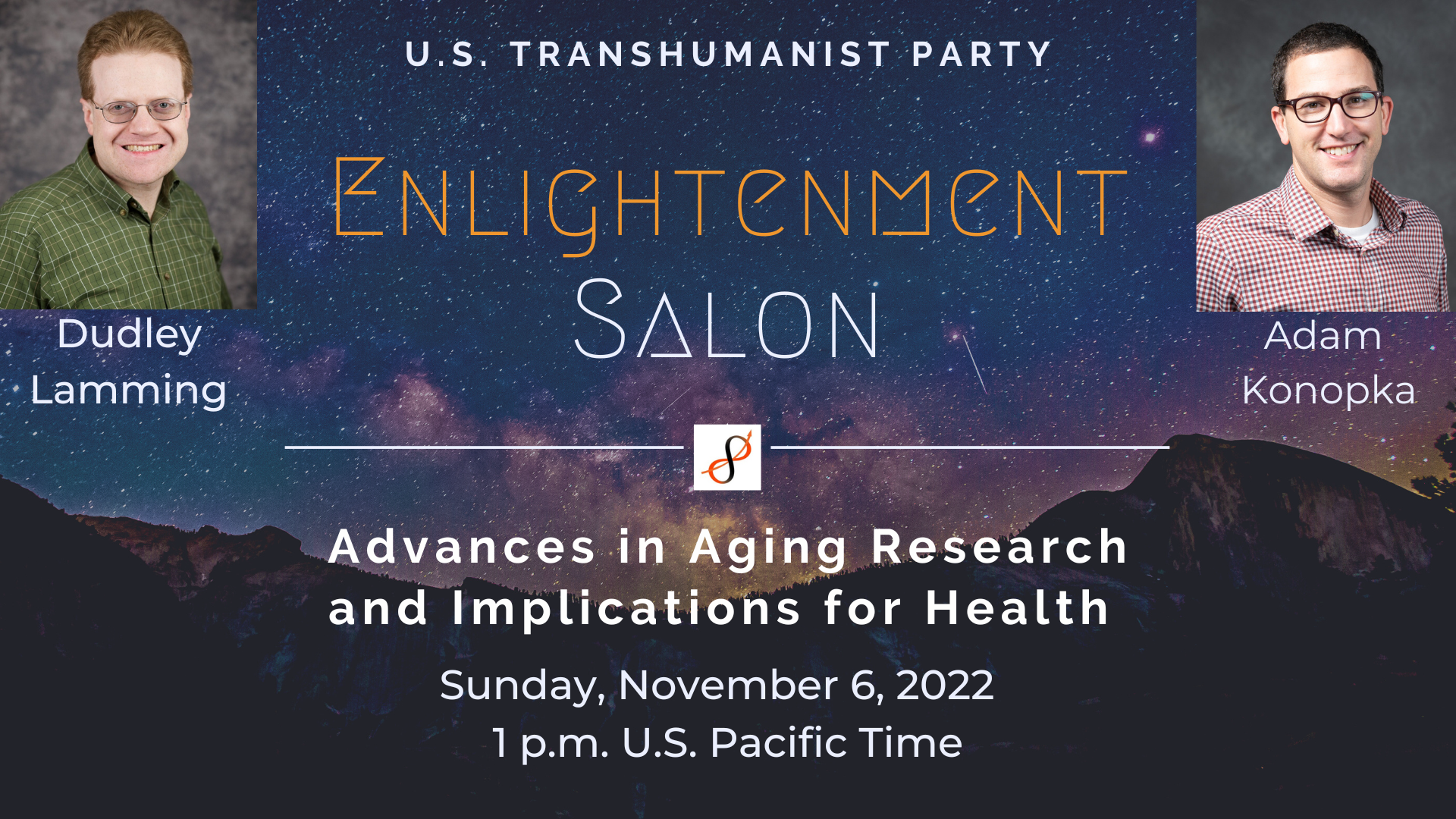U.S. Transhumanist Party Virtual Enlightenment Salon with Dudley Lamming and Adam Konopka – November 6, 2022

Dudley Lamming, PhD
Adam Konopka, PhD
Gennady Stolyarov II
Art Ramon Garcia, Jr.
Jason Geringer
Ben Ballweg
Bill Andrews, PhD
On Sunday, November 6, 2022, the U.S. Transhumanist Party invited Dudley Lamming, PhD, and Adam Konopka, PhD, MS, to discuss their research into aging and its amelioration, and the impact of their work on the promotion of human longevity, health, and fitness, and the prevention of diseases such as diabetes and osteoarthritis.
Dr. Dudley Lamming is a faculty member of the Division of Endocrinology, Diabetes, and Metabolism within the University of Wisconsin Department of Medicine. He is a fellow of the American Aging Association and the Gerontological Society of America; a recipient of the Gerontological Society of America Nathan Shock New Investigator Award and the American Physiological Society (Endocrinology and Metabolism Section) New Investigator Award; and an editorial board member of several peer-reviewed scientific journals.
Dr. Lamming’s research focuses on understanding how nutrient-responsive signaling pathways can be harnessed to promote health and longevity. One major focus of his research is the regulation of metabolic health and aging by diet. His laboratory discovered that low-protein diets promote metabolic health—improving blood-sugar control and reducing adiposity—in humans and mice, and has identified dietary branched-chain amino acids (BCAA) as key regulators of these effects. His team currently studies the mechanisms that mediate these beneficial effects in mice and humans, with the goal of identifying interventions to treat and prevent diabetes and obesity. A second major focus of his laboratory is studying how reducing consumption of BCAAs may promote longevity and fitness, with an emphasis on understanding the role of the mechanistic Target of Rapamycin (mTOR), an amino acid- and insulin-responsive protein kinase, in this response. A third focus of the laboratory is understanding the biology of mTOR Complex 2 (mTORC2), which is a key effector of PI3K/insulin signaling. Finally, the laboratory is studying the ability of geroprotective interventions to treat or prevent Alzheimer’s disease using mouse models.
Find out more about Dudley Lamming.
Dr. Adam Konopka is a faculty member in the Division of Geriatrics and Gerontology within the University of Wisconsin Department of Medicine. He is an editorial board member for the Journal of Applied Physiology and a member of the Gerontological Society of America, American College of Sports Medicine and American Physiological Society. Dr. Konopka has been selected as a reviewer for several journals including Journal Gerontology: Biological Sciences, Aging Cell, GeroScience, Science Advances, Scientific Reports, and Journal of Physiology.
Dr. Konopka uses a translational research approach that identifies mechanisms regulating the biology and metabolism of musculoskeletal aging in pre-clinical models and applies these findings to test the potential healthspan-extending effects in human clinical trials. Dr. Konopka’s research has two main themes that focus on the age-related loss of skeletal muscle health and osteoarthritis. He is currently investigating how skeletal muscle mitochondrial bioenergetics and remodeling mediate aging and the healthspan-extending effects of exercise and/or metformin. He is also interested in understanding how the mTOR signaling pathway is involved in the initiation and treatment of osteoarthritis.
Find out more about Adam Konopka.
Join the U.S. Transhumanist Party for free, no matter where you reside.





